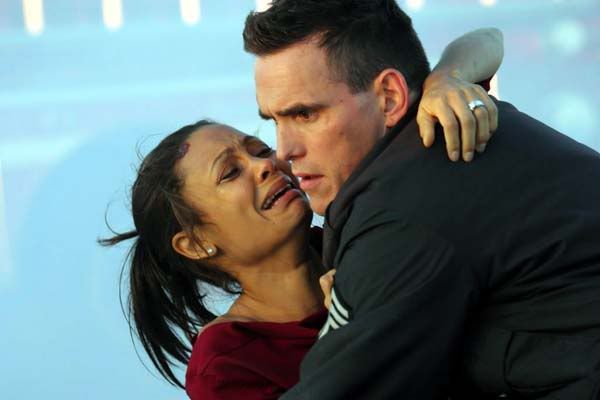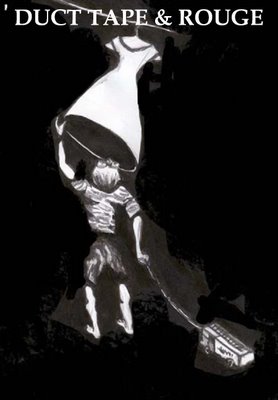A Scathing Review Of Crash
By Gary Oldroyd
Provocative, unflinching, honest, and piercing, Crash is a complex look at the deep-seeded racial intolerance in contemporary post-9/11 America. Bravo to director Paul Haggis for having the courage to enter into a tunnel of ethnic tensions, frayed nerves, and culture clash…moving forward with steady aim and conviction into the light, which can only represent one thing...Hope.
(And if you believe that, I have a script about an unkempt loner with a horrible case of jock-itch who scratches his way to the top of a Fortune-500 fungal cream corporation. Rags to Riches is an easy sell.)
Crash is none of the above, and now it's the “Best Picture” of 2005. (Sigh) Sure, it puts ethnic and racial tensions on the table for us all to look at, but it offers no insight. Haggis suggests (in a rather condescending manner) that the catchall for the anger we feel today is race. You may be saying to yourself, "Yeah, but I'm not angry." Well, you can stop your internal dialogue because Haggis thinks you are, and his characters are going to speechify and monologue until they are blue in the face about it.
(RACE! RACE! RACE!)
Okay Paul, we get it. Racism is inside each and every one of us; this is hardly a new revelation. This film would have served us better had it started instead of ended there. The movie is simple enough. (If you've seen Magnolia, then you're basically there.) A bunch of characters from different ethnic and religious backgrounds find their lives coincidentally (yet inexplicably) linked, interconnected, and intertwined while living in Los Angeles. As their lives intersect, their prejudices are exposed. They are forced to face them head on, and most of them come out the other side with an unspoken understanding (redemption?) that can only come with the sudden realization that you are a racist and need to change. (Sorta like the first step in an AA meeting.)
The film opens with what appears to be the aftermath of a car crash. People are already throwing around ethnic slurs. A female detective is chiding an angry Asian woman for not being able to pronounce the words 'brake light'. "Blake light, blake light!" And it is here that Haggis gives us the point of his film. One of the characters says that LA is disconnected, or rather, it's has no sense of touch. Everyone is always behind metal and glass. (Cars, I guess? The traffic here does suck!) He goes on to say, “We crash into each other just so we can feel something.” Really Paul? THAT'S why we crash? Now of course this is just a metaphor for the story we are about to be told, but does Haggis really expect us to believe that we call each other “niggers” and “spics” and “kikes” and “chinks” and “towel heads” and “crackers” because we just need to FEEL something? We're pent-up frustrated folks who need to unload on our fellow humans by attacking their cultural differences and skin tones to feel better about ourselves, or to feel sympathy towards others?
And it is here that Haggis gives us the point of his film. One of the characters says that LA is disconnected, or rather, it's has no sense of touch. Everyone is always behind metal and glass. (Cars, I guess? The traffic here does suck!) He goes on to say, “We crash into each other just so we can feel something.” Really Paul? THAT'S why we crash? Now of course this is just a metaphor for the story we are about to be told, but does Haggis really expect us to believe that we call each other “niggers” and “spics” and “kikes” and “chinks” and “towel heads” and “crackers” because we just need to FEEL something? We're pent-up frustrated folks who need to unload on our fellow humans by attacking their cultural differences and skin tones to feel better about ourselves, or to feel sympathy towards others?
 Perhaps there are some people who will be moved by this film's allegorical message, but I suspect that is because those same people haven't dealt with their own prejudices yet. Personally, I found the film's message to be laughable and offensive in its overly simplistic generalizations. I don't look at a Hispanic with tattoos and think: gang-banger. I don't look at an Arab cashier and think: Osama Bin Laden. I don't look at a black man and think: drug dealer. But the characters in Crash do. Not only do they think it, they shout it at you. When one of the characters in the film says (talking on the phone), “I'm angry all the time, and I don't know why.” I couldn't help but think, “For god's sake, QUIT WHINING!” The comment is lost on me because I know why I'm angry. I suspect the character knows too, but the film isn't interested in the minutiae. It is only interested in its grand sweeping stereotypes.
Perhaps there are some people who will be moved by this film's allegorical message, but I suspect that is because those same people haven't dealt with their own prejudices yet. Personally, I found the film's message to be laughable and offensive in its overly simplistic generalizations. I don't look at a Hispanic with tattoos and think: gang-banger. I don't look at an Arab cashier and think: Osama Bin Laden. I don't look at a black man and think: drug dealer. But the characters in Crash do. Not only do they think it, they shout it at you. When one of the characters in the film says (talking on the phone), “I'm angry all the time, and I don't know why.” I couldn't help but think, “For god's sake, QUIT WHINING!” The comment is lost on me because I know why I'm angry. I suspect the character knows too, but the film isn't interested in the minutiae. It is only interested in its grand sweeping stereotypes.
The upside to the film is performance. The ensemble cast -- not the usual suspects -- really chews up the script. Matt Dillon is superb. Terence Howard is great as always, and Michael Pena is particularly good. The Mark Isham score is well done, but Haggis uses it to manipulate his audience. (Cue sympathy music here.) The film feels cold, which is an interesting juxtaposition, because it is not cold in LA. While that cold look adds to the cold characterizations early on, I almost had to laugh when it snowed towards the end of the film. (For those that have seen Magnolia, think raining frogs.)
When this film was over I couldn't help but think about another far superior film, Grand Canyon (1991). It is a film about fears and possibilities and paths taken. Occasionally there are speeches, but they don't feel like speeches. They come off as personal externalizations, without ever being preachy. It also takes place in Los Angeles, and it too deals with breaking down barriers. There are coincidences, but the film doesn't rely on them to get you from place to place. It's about split-second decisions that we all have to make every day, and it's illustrated in every scene. I found it to be moving, hopeful, and enlightening. It's everything Crash would like to be, but isn't.
I have run across a lot of people who loved Crash and been moved by it. To each his own, but personally I find that to be a bit troubling. Crash is condescending, manipulative, and obvious without offering anything in return. The message: people are racist, and racism is a bad thing. To which I'd like to offer a most profound retort:
No shit.

Provocative, unflinching, honest, and piercing, Crash is a complex look at the deep-seeded racial intolerance in contemporary post-9/11 America. Bravo to director Paul Haggis for having the courage to enter into a tunnel of ethnic tensions, frayed nerves, and culture clash…moving forward with steady aim and conviction into the light, which can only represent one thing...Hope.
(And if you believe that, I have a script about an unkempt loner with a horrible case of jock-itch who scratches his way to the top of a Fortune-500 fungal cream corporation. Rags to Riches is an easy sell.)
Crash is none of the above, and now it's the “Best Picture” of 2005. (Sigh) Sure, it puts ethnic and racial tensions on the table for us all to look at, but it offers no insight. Haggis suggests (in a rather condescending manner) that the catchall for the anger we feel today is race. You may be saying to yourself, "Yeah, but I'm not angry." Well, you can stop your internal dialogue because Haggis thinks you are, and his characters are going to speechify and monologue until they are blue in the face about it.
(RACE! RACE! RACE!)
Okay Paul, we get it. Racism is inside each and every one of us; this is hardly a new revelation. This film would have served us better had it started instead of ended there. The movie is simple enough. (If you've seen Magnolia, then you're basically there.) A bunch of characters from different ethnic and religious backgrounds find their lives coincidentally (yet inexplicably) linked, interconnected, and intertwined while living in Los Angeles. As their lives intersect, their prejudices are exposed. They are forced to face them head on, and most of them come out the other side with an unspoken understanding (redemption?) that can only come with the sudden realization that you are a racist and need to change. (Sorta like the first step in an AA meeting.)
The film opens with what appears to be the aftermath of a car crash. People are already throwing around ethnic slurs. A female detective is chiding an angry Asian woman for not being able to pronounce the words 'brake light'. "Blake light, blake light!"
 And it is here that Haggis gives us the point of his film. One of the characters says that LA is disconnected, or rather, it's has no sense of touch. Everyone is always behind metal and glass. (Cars, I guess? The traffic here does suck!) He goes on to say, “We crash into each other just so we can feel something.” Really Paul? THAT'S why we crash? Now of course this is just a metaphor for the story we are about to be told, but does Haggis really expect us to believe that we call each other “niggers” and “spics” and “kikes” and “chinks” and “towel heads” and “crackers” because we just need to FEEL something? We're pent-up frustrated folks who need to unload on our fellow humans by attacking their cultural differences and skin tones to feel better about ourselves, or to feel sympathy towards others?
And it is here that Haggis gives us the point of his film. One of the characters says that LA is disconnected, or rather, it's has no sense of touch. Everyone is always behind metal and glass. (Cars, I guess? The traffic here does suck!) He goes on to say, “We crash into each other just so we can feel something.” Really Paul? THAT'S why we crash? Now of course this is just a metaphor for the story we are about to be told, but does Haggis really expect us to believe that we call each other “niggers” and “spics” and “kikes” and “chinks” and “towel heads” and “crackers” because we just need to FEEL something? We're pent-up frustrated folks who need to unload on our fellow humans by attacking their cultural differences and skin tones to feel better about ourselves, or to feel sympathy towards others? Perhaps there are some people who will be moved by this film's allegorical message, but I suspect that is because those same people haven't dealt with their own prejudices yet. Personally, I found the film's message to be laughable and offensive in its overly simplistic generalizations. I don't look at a Hispanic with tattoos and think: gang-banger. I don't look at an Arab cashier and think: Osama Bin Laden. I don't look at a black man and think: drug dealer. But the characters in Crash do. Not only do they think it, they shout it at you. When one of the characters in the film says (talking on the phone), “I'm angry all the time, and I don't know why.” I couldn't help but think, “For god's sake, QUIT WHINING!” The comment is lost on me because I know why I'm angry. I suspect the character knows too, but the film isn't interested in the minutiae. It is only interested in its grand sweeping stereotypes.
Perhaps there are some people who will be moved by this film's allegorical message, but I suspect that is because those same people haven't dealt with their own prejudices yet. Personally, I found the film's message to be laughable and offensive in its overly simplistic generalizations. I don't look at a Hispanic with tattoos and think: gang-banger. I don't look at an Arab cashier and think: Osama Bin Laden. I don't look at a black man and think: drug dealer. But the characters in Crash do. Not only do they think it, they shout it at you. When one of the characters in the film says (talking on the phone), “I'm angry all the time, and I don't know why.” I couldn't help but think, “For god's sake, QUIT WHINING!” The comment is lost on me because I know why I'm angry. I suspect the character knows too, but the film isn't interested in the minutiae. It is only interested in its grand sweeping stereotypes.The upside to the film is performance. The ensemble cast -- not the usual suspects -- really chews up the script. Matt Dillon is superb. Terence Howard is great as always, and Michael Pena is particularly good. The Mark Isham score is well done, but Haggis uses it to manipulate his audience. (Cue sympathy music here.) The film feels cold, which is an interesting juxtaposition, because it is not cold in LA. While that cold look adds to the cold characterizations early on, I almost had to laugh when it snowed towards the end of the film. (For those that have seen Magnolia, think raining frogs.)
When this film was over I couldn't help but think about another far superior film, Grand Canyon (1991). It is a film about fears and possibilities and paths taken. Occasionally there are speeches, but they don't feel like speeches. They come off as personal externalizations, without ever being preachy. It also takes place in Los Angeles, and it too deals with breaking down barriers. There are coincidences, but the film doesn't rely on them to get you from place to place. It's about split-second decisions that we all have to make every day, and it's illustrated in every scene. I found it to be moving, hopeful, and enlightening. It's everything Crash would like to be, but isn't.
I have run across a lot of people who loved Crash and been moved by it. To each his own, but personally I find that to be a bit troubling. Crash is condescending, manipulative, and obvious without offering anything in return. The message: people are racist, and racism is a bad thing. To which I'd like to offer a most profound retort:
No shit.

<< Back to the Table of Contents